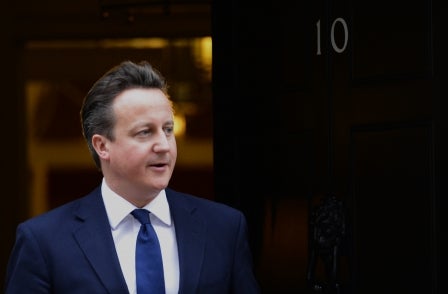
-
Miller: 'We will not accept a puppet show'
-
Harman: 'the definition of insanity' to expect press to get its house in order
-
Labour drawing up a 'tightly drafted and forensic' Bill
-
Editors warned: 'Clock is ticking'
Newspaper editors have been warned by David Cameron that they must act "urgently" to set up an independent press regulator.
The Prime Minister took part in a summit of senior industry figures at Number 10 to hear proposals for a new regime not backed by law.
Culture Secretary Maria Miller has made clear that the option of legislation called for by the Leveson Report remains an option if progress cannot be made.
"I've just spoken to newspaper editors in No 10 – telling them they need to set up an independent regulator urgently," Cameron wrote on Twitter.
Speaking after taking part in the high-level meeting, Cameron said he had made clear that "the clock is ticking" for the industry to agree action.
"They have got to do it in a way that absolutely meets the requirement of Lord Justice Leveson's report," he said.
"That means million-pound fines, proper investigation of complaints, prominent apologies, a tough independent regulatory system.
"And they know, because I told them, the clock is ticking for this to be sorted out."
The Prime Minister has expressed "serious concerns and misgivings" about resorting to any form of statutory underpinning for press regulation.
But with Labour and the Liberal Democrats united in favour, his own backbenches split and phone-hacking victims leading a campaign for full implementation, he is under huge pressure.
An online petition launched by campaign group Hacked Off has so far attracted more than 135,000 signatures in favour of statutory underpinning.
Miller told MPs last night that change has to happen either "with the support of the press or – if we are given no option – without it".
Action "would include legislation" if industry proposals fall short of Leveson's principles, she said, warning against a "puppet show with the same people pulling the same strings".
Lord Hunt – who chairs the existing Press Complaints Commission – went into the talks claiming the support of 120 publishers, representing 2,000 editors, for a new independent regulator.
He believes legally-enforceable membership contracts could be used to give the new system force and avoid the need for statutory backing.
Officials at Miller's Culture Department are drawing up a draft Bill to enact Leveson's recommendations in full.
But she has indicated that she expects it to provide confirmation of concerns about the complexity and potential negative impact on press freedom.
Labour is drawing up its own draft legislation to demonstrate that Leveson's recommendations could be implemented without the difficulties feared by ministers.
The Opposition's Bill is expected to be completed before Christmas, paving the way for it to force a Commons vote by the end of January if no agreement is reached in cross-party talks.
Opening a Commons debate on the Leveson proposals yesterday, Miller told MPs the status quo was not an option in the light of the PCC's failure to prevent abuses by elements of the press.
"Change can either come with the support of the press or – if we are given no option – without it. Be in no doubt that if the industry doesn't respond, the Government will," she said.
Action "would include legislation" if industry proposals fall short of Leveson's principles that a new regulator must be truly independent and able to impose big fines on newspapers, she said.
"We will not accept a puppet show with the same people pulling the same strings."
Officials at Miller's Culture Department are drawing up a draft Bill to enact Leveson's recommendations in full.
But she has indicated that she expects it to provide confirmation of concerns about the complexity and potential negative consequences of extending statutory controls over the press.
Any legislation could be amended by future administrations to muzzle the press and would harm the UK's reputation abroad as an advocate of free speech, she told MPs.
Her comments came after cross-party talks with Labour culture spokeswoman Harriet Harman and Liberal Democrat Lord Wallace, whose leaders have both voiced support for legislation.
Labour sources characterised the talks, which lasted around 30 minutes, as "constructive" and said leader Ed Miliband was still hoping to find consensus on a way forward.
But there was little sign of agreement in the debate in which Harman said self-regulation had repeatedly failed to prevent unwarranted intrusion by the press.
It would be "the definition of insanity" to expect the press to get its house in order without oversight backed by law after all previous attempts to do so had failed, she told MPs.
A "tightly drafted and forensic" Bill being drawn up by Labour would demonstrate that Leveson's recommendations could be implemented without the difficulties feared by ministers, she said.
The Opposition's Bill is expected to be completed before Christmas, paving the way for Miliband to force a Commons vote by the end of January if no cross-party agreement is reached.
With Labour and Lib Dems in favour of statutory underpinning, any such vote would present the real prospect of defeat for Mr Cameron, though it would not be binding on the Government.
Downing Street dismissed suggestions that the Culture Department Bill would be deliberately drafted to maximise the potential obstacles to legislation.
"We are approaching these talks in good faith and we will draft the legislation accordingly," said the Prime Minister's official spokesman.
"The Prime Minister's view – which he set out in the House of Commons – is that it is likely that legislation will be quite complicated in practice. But we are progressing the work on that, and will continue the talks."
Email pged@pressgazette.co.uk to point out mistakes, provide story tips or send in a letter for publication on our "Letters Page" blog
